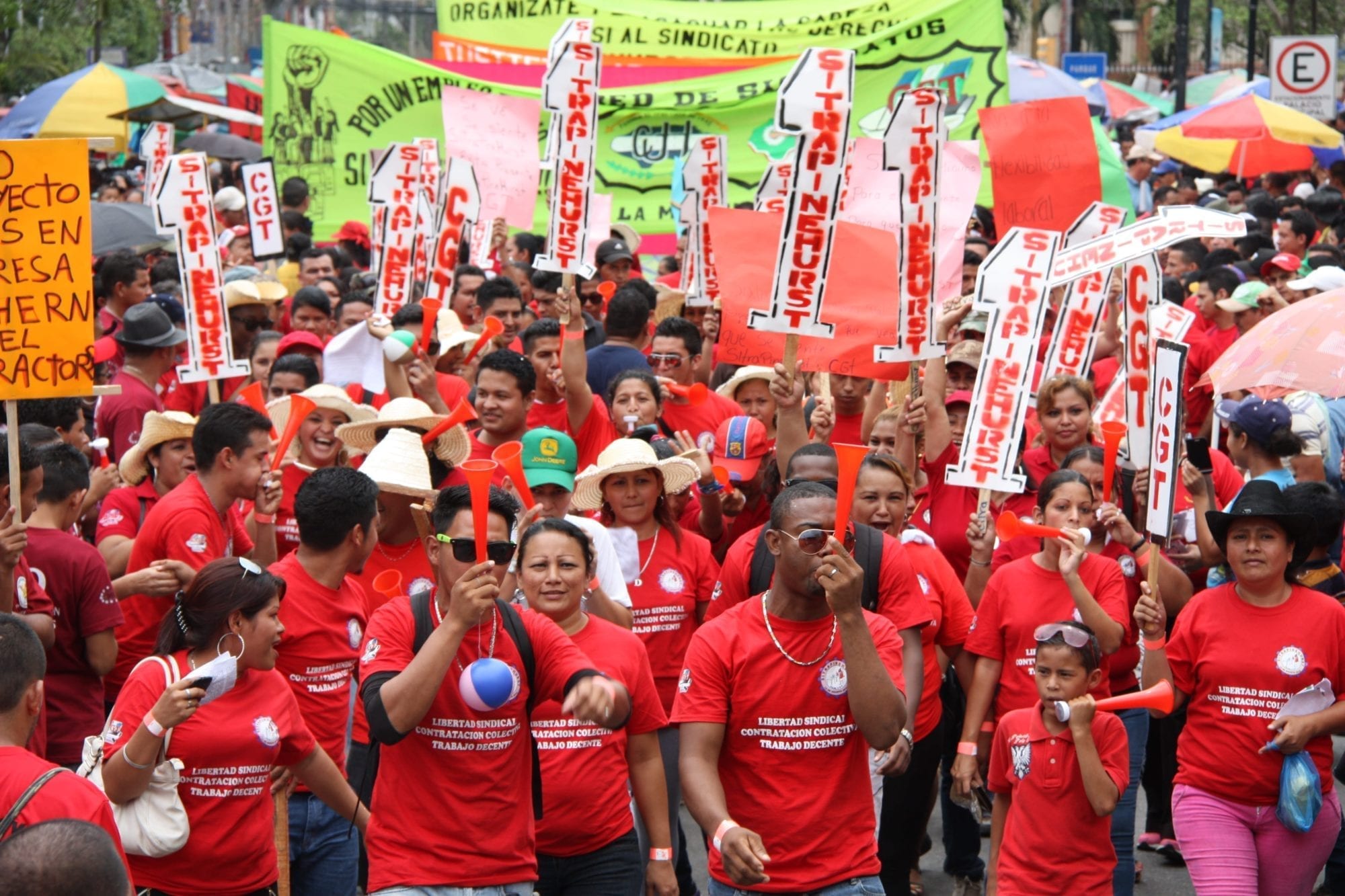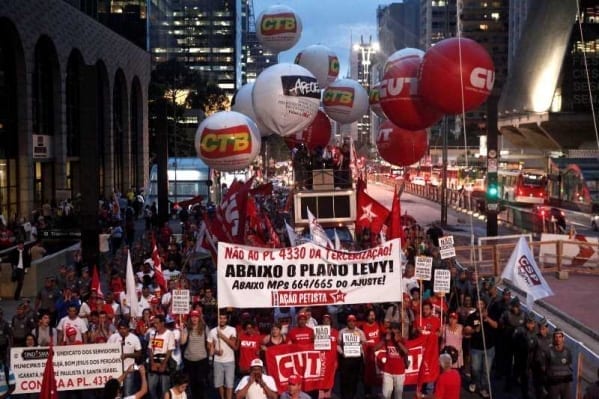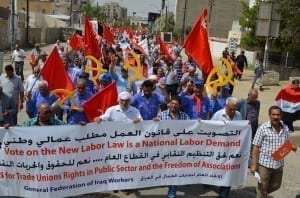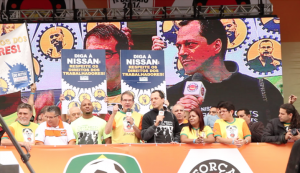Aug 24, 2015
More than 60 people from Latin America—including the Dominican Republic, Chile, Colombia and Honduras—along with U.S. representatives met last week in Brazil to affirm labor’s continued commitment to racial equality through a broad-based economic justice movement, mark the 20th year of trade unions’ efforts to eliminate race-based economic inequality in the Americas, and call for Colombians of African descent to be included in peace talks in that country.
“There is a persistent, violent and dehumanizing racism in our societies. As Afro-descendants, we must continue the fight for our dignity,” said Francisco Quintino, president of the Inter-American Union Institute for Racial Equality (INSPIR), a labor coalition dedicated to fighting for racial justice in the Americas.
“This is an issue of humanity,” he said.
INSPIR has worked with trade union partners and like-minded allies across the Americas to combat racial and ethnic discrimination in the workplace and give union leaders tools to promote equality in their organizations and society since its founding by the AFL-CIO, three Brazilian national centers (CUT, Força Sindical and UGT) and the Trade Union Confederation of the Americas (TUCA) in 1995.
“The tie… is our common cause of fighting racism, within the labor movement, and hopefully, too, as part of a broader social and economic justice movement for racial equality,” said Joslyn Williams, general secretary of INSPIR, who also represented the AFL-CIO at the conference as D.C. Metro Labor Council president and a trustee for the U.S.-based Coalition of Black Trade Unionists (CBTU).
Fred Redmond, vice president of the United Steelworkers (USW), also attended on behalf of the AFL-CIO and CBTU.
Delegates to the Continental Conference passed a resolution calling for Colombians of African descent to be represented in peace negotiations and post-conflict implementation in that country.
More than 150 people attended the opening ceremony of the 20th Anniversary Celebration and Continental Conference, held August 17–19, 2015, in São Paulo. Brazil’s Minister of the Promotion of Racial Equality Policies, Nilma Lino Gomes, keynoted the event.
The Solidarity Center works with INSPIR in Brazil to empower Afro-descendant workers to fight for their rights and overcome the tragic legacy of the more than 400 years of slavery, through education, collective bargaining and policy advocacy.

May 5, 2015
Hundreds of thousands of workers and their unions around the world marked International Workers Day May 1. For many, the day provided a time to push for living wages and safe workplaces. Yet this year, governments in some countries like Bahrain and Swaziland banned May Day celebrations or threatened workers with retaliation if they turned out—and some brave workers defied these edicts to exercise their freedom to gather in public spaces.
Elsewhere, workers like those in Bangladesh who often are prevented from forming unions or exercising their fundamental worker rights, called for the freedom to join unions and correct workplace injustices.
Sumi Begum, 25, a Bangladeshi garment worker, says that she and other workers at her factory have not received salaries or overtime pay for the past two months, but they cannot raise the issue with the manager because they fear they would be terminated if they did so.
“Garment factories that have union are not facing these kinds of problems,” she says. “The condition of those garment industries is much better than ours.”
[portfolio_slideshow id=4427]

Apr 15, 2015
Brazil lawmakers have postponed a vote on a bill that would expand job outsourcing after a series of union-led protests drew tens of thousands of workers to streets across the country. The law would allow public and private employers to contract out all jobs, enabling employers to replace workers who have direct employment contracts with employees who could be paid up to 25 percent less. Some 12 million Brazilians already are employed as outsourced contractors, principally in cleaning and security services.
The Central Unica dos Trabalhadores (CUT), Central dos Trabalhadores e Trabalhadoras do Brasil (CTB), Intersindical, CONLUTAS and other unions spearheaded two national days of protest against the bill, most recently on April 15, when unions led peaceful protests in the capitals of all 27 Brazilian states. In São Paulo, more than 10,000 participants, including housing activists and student groups, temporarily stopped traffic on the city’s main roads. Uniao Geral dos Trabalhadores (UGT) also recently joined the coalition opposing the bill.
During similar protests on April 7, military police in Brasilia, the capital, blocked union members from entering the spectators’ gallery of the Congress, detaining four people and injuring eight others, according to the global union IndustriALL.
Under the bill, PL 4330, companies that contract outsourced services would not be directly responsible for any violations of outsourced workers’ labor rights. It also would allow outsourced workers to be represented by outsourced workers unions, and not by the unions that represent the directly-contracted workers at the companies where they are employed.
Lawmakers are expected to take up the bill next week.
May 2, 2014

Iraqi union members rally for changes to the country’s Saddam Hussein-era labor code. Credit: Wesam Chaseb Ouda
Union members in Bangladesh, Brazil, Iraq and Morocco were among Solidarity Center allies around the world who rallied, marched in parades and protested in the streets yesterday, marking May Day and the ongoing struggle to ensure workers have a place at the table in the larger global economy and at their workplaces.
In Brazil, UAW President Bob King joined the union Força Sindical at a May Day event with some 1.3 million workers. Iraq workers and their unions marched for passage of a revised law, now under debate in Parliament. Iraqi workers are still covered by a Saddam Hussein-era labor code.
Workers in Morocco celebrated the announcement of a 10 percent boost (over two years) in the minimum wage in the public and private sectors, an action spearheaded by trade unions. The minimum retirement pension also will be boosted, and student grants will increase. Workers say many improvements still must be made, however, and in rallies across the country challenged rising prices and high unemployment and called for social security coverage for all workers and respect for collective and personal freedom.

UAW Bob King (center, yellow shirt) joined Força Sindial and 1.3 million workers in Brazil. Credit: Solidarity Center
In Bangladesh, tens of thousands of garment workers turned out in events across the country. At the Jatiya Press Club in Dhaka, the capital, some 12,000 workers gathered, with many forming a human chain. Speaking at one event, Kamrul Hasan, president of Akota Garments Labor Federation, demanded workplace safety so garment workers never again die or become injured from factory fires or collapsed buildings, like Rana Plaza, which pancaked in last April, killing more than 1,110 workers.
In Gazipur, Bangladesh, women made up the majority of the 2,000 garment workers taking part in events sponsored by the Bangladesh Independent Garments Union Federation (BIGUF). Shumi, president of Masco Industries Ltd. (Knit and Composite) Workers Union, said thousands of workers turned out spontaneously this May Day to assert their rights to a union. Other Solidarity Center allies holding events include the National Garments Workers Federation’s (NGWF), the Bangladesh Garments and Industrial Workers Federation’s (BGIWF), the National Garments Workers Federation’s (NGWF) and the Bangladesh Federation of Workers Solidarity (BFWS).
Mar 27, 2014

Construction unions and migrant workers met this week in Costa Rica. Photo coursesy of BWI.
This week, eight construction union federation from six South and Central American countries came together in Costa Rica to focus on migrant workers and the issues they face in order to help migrants working in construction to organize and to improve union capacity to expand worker rights for migrant and native workers alike.
The seminar, jointly assembled by the Solidarity Center and Building and Woodworkers International (BWI), allowed union representatives the opportunity to present best practices for organizing migrant workers and to speak directly with Nicaraguan day laborers who also are active members of the Costa Rican BWI affiliate, SUNTRACS. Union leaders heard firsthand accounts of the daily challenges that Nicaraguan migrants face on the job and in Costa Rican society in general, where discrimination—including denial of treatment by the national health service for work-related injuries and receiving salaries that are below the national minimum wage—is a fact of life.
According to the International Labor Organization (ILO), more than 5 million people currently live and work in Latin American countries other than those in which they were born. Once a phenomenon almost exclusively restricted to developed countries in the Northern Hemisphere, positive trends in economic growth and job creation have converted numerous Latin American countries—such as Brazil, Chile, Argentina and Costa Rica—into attractive destinations for migrant workers over the last decade. Nonetheless, the promise of decent employment in these countries in sectors including construction, domestic work and agroindustry has remained elusive, particularly for workers without solid knowledge of their own labor rights enshrined by national law and international norms.
On a regional level, BWI and its affiliates have helped migrant workers obtain legal migratory status and advocated for more transparent national immigration policies. Most importantly, they have organized protest actions against insecure work environments, long working hours and wage irregularities for migrant workers.
BWI has seen positive results from its outreach efforts to migrant workers. “Objective economic conditions in Latin America have given new life to construction unions in the Southern Cone. The current construction boom in Brazil, for example, parallels what we saw in countries like the United States and Spain before the 2008 economic crisis,” said Nilton Freitas, BWI regional representative for Latin America and the Caribbean. “Using this new leverage and employing better forms of cooperation among our affiliates, we now are in a more advantageous position to prevent migrant workers from being treated as second-class citizens in the construction sector in those countries.”
The Solidarity Center and Building and Woodworkers International (BWI) have been working together over the last three years to promote innovative policies to improve union outreach and organization of migrant workers in the civil construction sector in Latin America. BWI’s pioneering role in the defense of immigrants who have sacrificed all to construct soccer stadiums in Brazil, skyscrapers in Singapore and offshore oil rigs in the Arabian Gulf was recently recognized by the AFL-CIO as the 2014 recipient of its prestigious George Meany-Lane Kirkland Human Rights Award.





